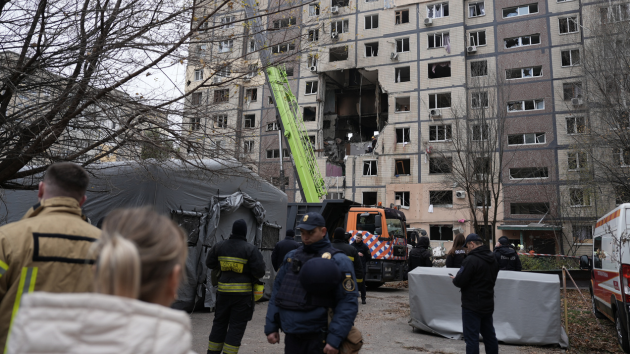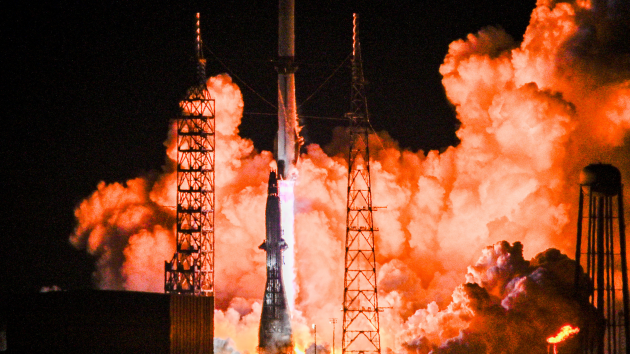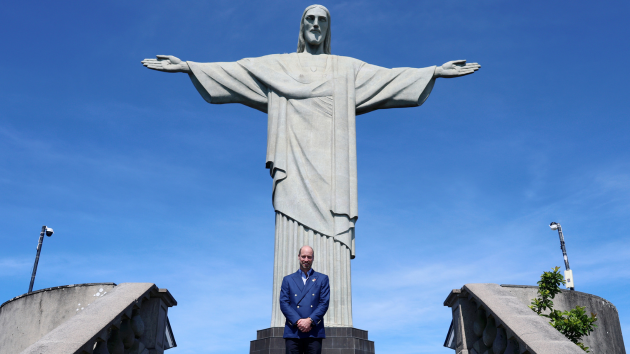Doctors and patients recall horror of Russian strike on Kyiv children’s hospital
Written by ABC Audio ALL RIGHTS RESERVED on July 26, 2024

(KYIV, Ukraine) — Solomiya Fomeniuk, 16, recalled the Russian missile strike on the Okhmatdyt pediatric hospital in Ukraine earlier this month with horror, but also as a case of miraculous survival.
The girl was one of five children in the dialysis department at the moment of the attack on July 8. Two people — a doctor and a teacher — died as a result of the strike. A 7-year-old boy died later after he was transported away from the site, officials said.
Solomiya is disabled due to spinal hernia. The girl was admitted to the Kyiv hospital in late May 2022 after kidney failure.
“It’s the best clinic in Ukraine with a dialysis department and the only one where we can actually live to receive treatment regularly,” Solomiya’s mother, Oksana Fomeniuk, told ABC.
July 8 started as usual, she said, adding that even when the sirens went off, it didn’t initially scare the parents nor hospital staff.
“We’ve been here for a while, there were at least two impacts nearby during the past two years, but we always thought that a hospital is a safe place,” she said. “We are always anxious of course, but the kids learned to be courageous and patient since dialysis lasts for 4 to 5 hours and they can’t move during the procedure”.
However, when the first missiles hit the ground a couple kilometers from the hospital Oksana and others quickly went down to the shelter while doctors and nurses decided to go into the room to switch the kids off from the dialysis equipment and take them downstairs too. At that moment the missile hit.
“The first thing I saw was a piece of ceiling above me,” Solomiya recalled. “The equipment around prevented it from falling on me. I even raised my hands to try to hold it. I couldn’t breathe, there was dust and hot air around. And this smell…”
The girl saw two injured female doctors and a nurse lying on the floor bleeding, she said.
“One doctor, Anastasia, shook up from our cries, stood up and came up to pull me from the rubbles,” Solomiya said. “She is so tiny herself, but somehow managed to carry me to the window where men who ran from the street were already helping.”
Most of all the girl was worried about her mom, she confessed. Oksana herself barely got out of the rubble as the missile hit right at the foundation of the building.
“I smelled death,” she said. “I was in the rubble by the knees and couldn’t breathe because of the dust and the smell of the fuel.”
Oksana managed to run out through the back door.
“The second thing that shocked me was the scale of the damage,” she said. “Everything was in a black smoke, the building was destroyed, others half damaged. And all I could think about was where my Solomiya were.”
Oksana saw pieces of furniture and mattresses around, a body inside the premise, children coming out of the building through the broken windows, nurses carrying them out — and said she couldn’t believe that her daughter was alive.
“The nurse was running and shouting that Solomiya was OK and she was taken to another building, but I only believed that when I saw her there. I’m telling you, God saved us. Because if my girl were in another bed, as before, she could have died.”
Svitlana Lukyanchuk, a 30-year-old nephrologist, was later identified as the woman who had died in the room. The head of the dialysis department, Olha Babicheva, was also severely injured, officials said.
Young surgeon Oleh Golubchenko also said he believed he was lucky to be alive. Photos and videos of him in a white bloody uniform as he helped to search the debris went viral.
“My grandma carefully washed and whitened the robe right on the day before. I think I haven’t even thrown it away yet,” Golubchenko said, laughing both bitterly and with relief.
He had been performing a halo rhinoplasty on a 5-month-old patient on the morning of July 8.
“It’s a complicated procedure, but very interesting for me as a specialist. I pre-planned everything on the weekend, designed a model of the expected result,” Golubchenko told ABC.
The surgeon, anesthesiologist Yaroslav Ivanov, second surgeon Ihor Kolodko and nurse Olha Baranovych were halfway through the surgery when the siren went off in Kyiv.
“We don’t start operations during the air raid alert, but if we have already started we have to continue because you can’t move the patient quickly, especially a kid. So we carried on, stayed calm and even joked,” Golubchenko recalled.
When the missile hit the nearby building the wave threw him a couple of meters away from the operating table. “I was shocked for a few seconds and then saw everyone on the floor, bleeding. I shouted, ‘Is everyone alive?’ Olha, the nurse, was apparently severely injured, I saw her face really damaged. Yaroslav was bleeding too but got up.”
The doctors rushed to their little patient covered by surgical gowns. The boy was intubated, so Golubchenko couldn’t check if he was actually OK.
“I ran in the corridor to find an Ambu bag. The boy’s mom was there, shouting hysterically … I found the bag, the anesthesiologist disconnected the boy and quickly carried him away, I followed him … on my way I stopped to help another nurse as she was bleeding, so I bandaged her … There was such a chaos, total mess,” he said.
When Oleh went outside, the first person to call him was his friend, Rostyslav, who is also a surgeon, as he heard of the strike.
“I asked him to pick my patient and finish the surgery,” Golubchenko said. “He literally was here in 15 minutes and took the boy.” Taras, the boy who had been in surgery, and his parents are well now, Golubchenko said.
Only later did Golubchenko notice that he himself was covered in blood.
“I just felt something warm on my back and legs. Those were all small wounds from the glass. The doctors took everything away and said I had a concussion. I think I escaped with a fright. Big fright,” the surgeon said, sighing. “You know, before the surgery, the patient’s father asked me whether I believed in God. What a question! But now my outlook has transformed. I’m telling you, I went to the church the following day and prayed as I could.”
It’s painful for Golubchenko to see his department damaged as it had been just renovated. It was even more painful for many Ukrainians. Okhmatdyt, which in Ukrainian means protection of motherhood and childhood, is the best pediatric hospital in Ukraine. The doctors say they received incredible support from the management, while parents admit everything was done from the heart here, with great love to kids so that they experience as much fun and comfort here as possible.
In just one day, people and businesses raised more than $7 million for Okhmatdyt through the joint project of the UNITED24 presidential fundraising platform and Monobank. Germany accepted kids from the Kyiv hospital and pledged about 10 million euros for the reconstruction of the hospital.
Oleh Holubchenko said he himself received calls from his American colleagues who have helped a lot, in particular Smile Train, the world’s largest cleft-focused organization, and American Cleft Palate-Craniofacial Association
Fomeniuk and her daughter, Solomiya, said their hopes for Solomiya’s kidney transplantation, which they have been waiting for since last fall, have now now faded a bit due to the strike. But they still showed their support for the hospital and optimism for the doctors, who they hope keep going.
The attack on Okhmatdyt on July 8 was one of more than 1,800 such strikes in Ukraine since Russia’s full-scale invasion began in February 2022, according to the World Health Organizaition.
Oksana confessed she sometimes thinks that horrible strike didn’t actually happen and it was just a horror movie because it doesn’t seem real.
“The missiles flying in Kyiv are not something normal by default,” she said. “When kids who are fighting for their lives have to suffer even more during the attacks is something totally, totally over the line.”
Copyright © 2024, ABC Audio. All rights reserved.





